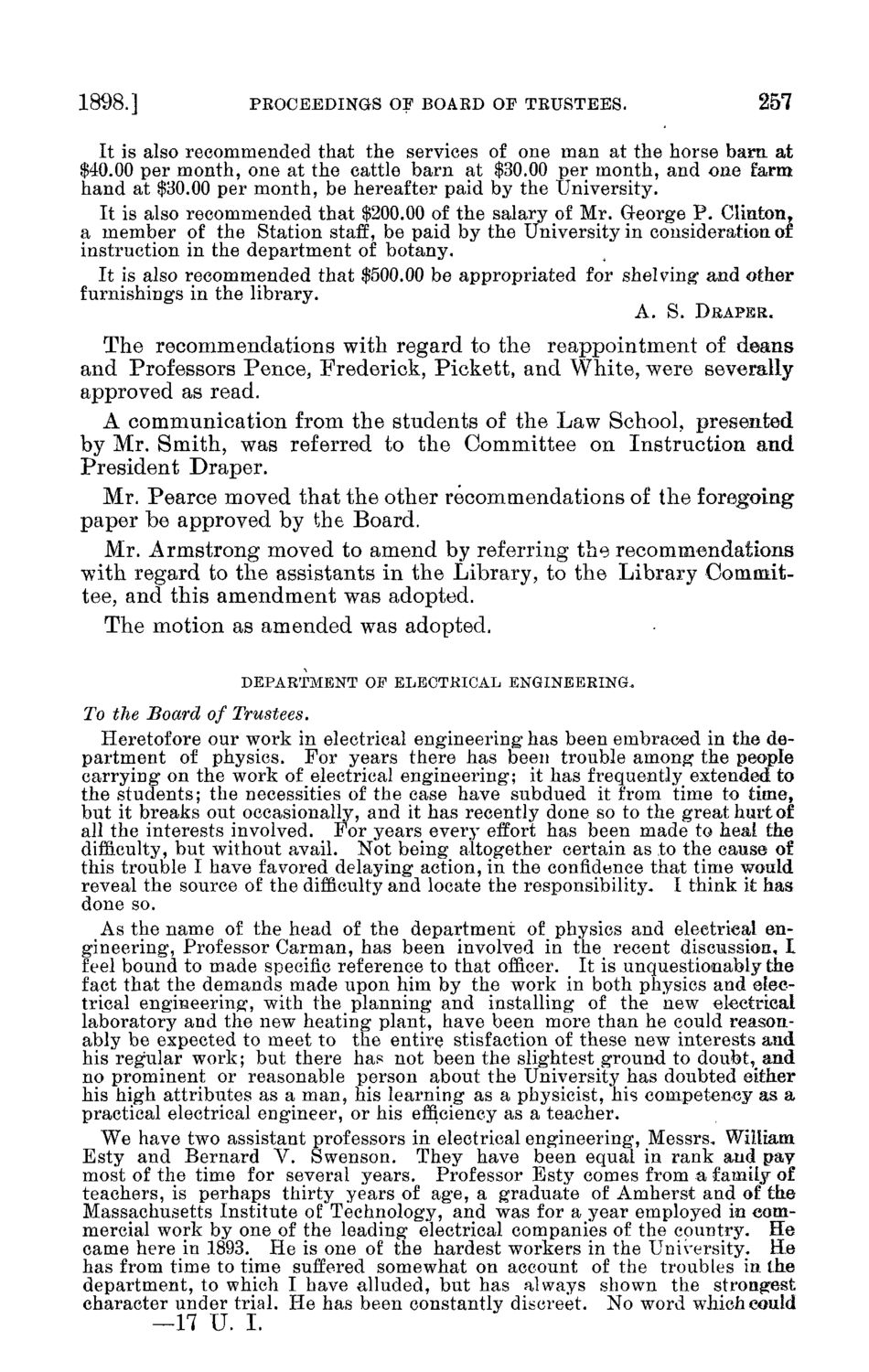| |
| |
Caption: Board of Trustees Minutes - 1898
This is a reduced-resolution page image for fast online browsing.

EXTRACTED TEXT FROM PAGE:
1898.] PROCEEDINGS OF BOAED OF TRUSTEES. 257 It is also recommended that the services of one man at the horse barn at $40.00 per month, one at the cattle barn at $30.00 per month, and one farm hand at $30.00 per month, be hereafter paid by the University. It is also recommended that $200.00 of the salary of Mr. George P. Clinton, a member of the Station staff, be paid by the University in consideration of instruction in the department of botany. It is also recommended that $500.00 be appropriated for shelving and other furnishings in the library. A. S. DRAPER. T h e r e c o m m e n d a t i o n s with regard to the r e a p p o i n t m e n t of d e a n s and Professors P e n c e , F r e d e r i c k , P i c k e t t , a n d W h i t e , were severally approved as read. A c o m m u n i c a t i o n from t h e s t u d e n t s of t h e L a w School, presented by Mr. S m i t h , was referred to t h e C o m m i t t e e on I n s t r u c t i o n a n d President Draper. Mr. P e a r c e moved t h a t t h e other r e c o m m e n d a t i o n s of t h e foregoing p a p e r b e approved by the Board. Mr. A r m s t r o n g moved to a m e n d by referring t h e recommendations with regard to t h e assistants in t h e L i b r a r y , to t h e L i b r a r y Committee, and this a m e n d m e n t was adopted. T h e motion as a m e n d e d was adopted. DEPARTMENT OF ELECTRICAL ENGINEERING. To the Board of Trustees. Heretofore our work in electrical engineering has been embraced in the department of physics. For years there has been trouble among the people carrying on the work of electrical engineering; it has frequently extended to the students; the necessities of the case have subdued it from time to time, but it breaks out occasionally, and it has recently done so to the great hurt of all the interests involved. For years every effort has been made to heal the difficulty, but without avail. Not being altogether certain as to the cause of this trouble I have favored delaying action, in the confidence that time would reveal the source of the difficulty and locate the responsibility. I think it has done so. As the name of the head of the department of physics and electrical engineering, Professor Carman, has been involved in the recent discussion, I feel bound to made specific reference to that officer. It is unquestionably the fact that the demands made upon him by the work in both physics and electrical engineering, with the planning and installing of the new ^1-eetrical laboratory and the new heating plant, have been more than he could reasonably be expected to meet to the entire stisfaction of these new interests and his regular work; but there has not been the slightest ground to doubt, and no prominent or reasonable person about the University has doubted either his high attributes as a man, his learning as a physicist, his competency as a practical electrical engineer, or his efficiency as a teacher. We have two assistant professors in electrical engineering, Messrs. William. Esty and Bernard V. Swenson. They have been equal in rank and pay most of the time for several years. Professor Esty comes from a family of teachers, is perhaps thirty years of age, a graduate of Amherst and of the Massachusetts Institute of Technology, and was for a year employed in commercial work by one of the leading electrical companies of the country. He came here in 1893. He is one of the hardest workers in the University. He has from time to time suffered somewhat on account of the troubles in the department, to which I have alluded, but has always shown the strongest character under trial. He has been constantly discreet. No word which could —17 U. I.
| |